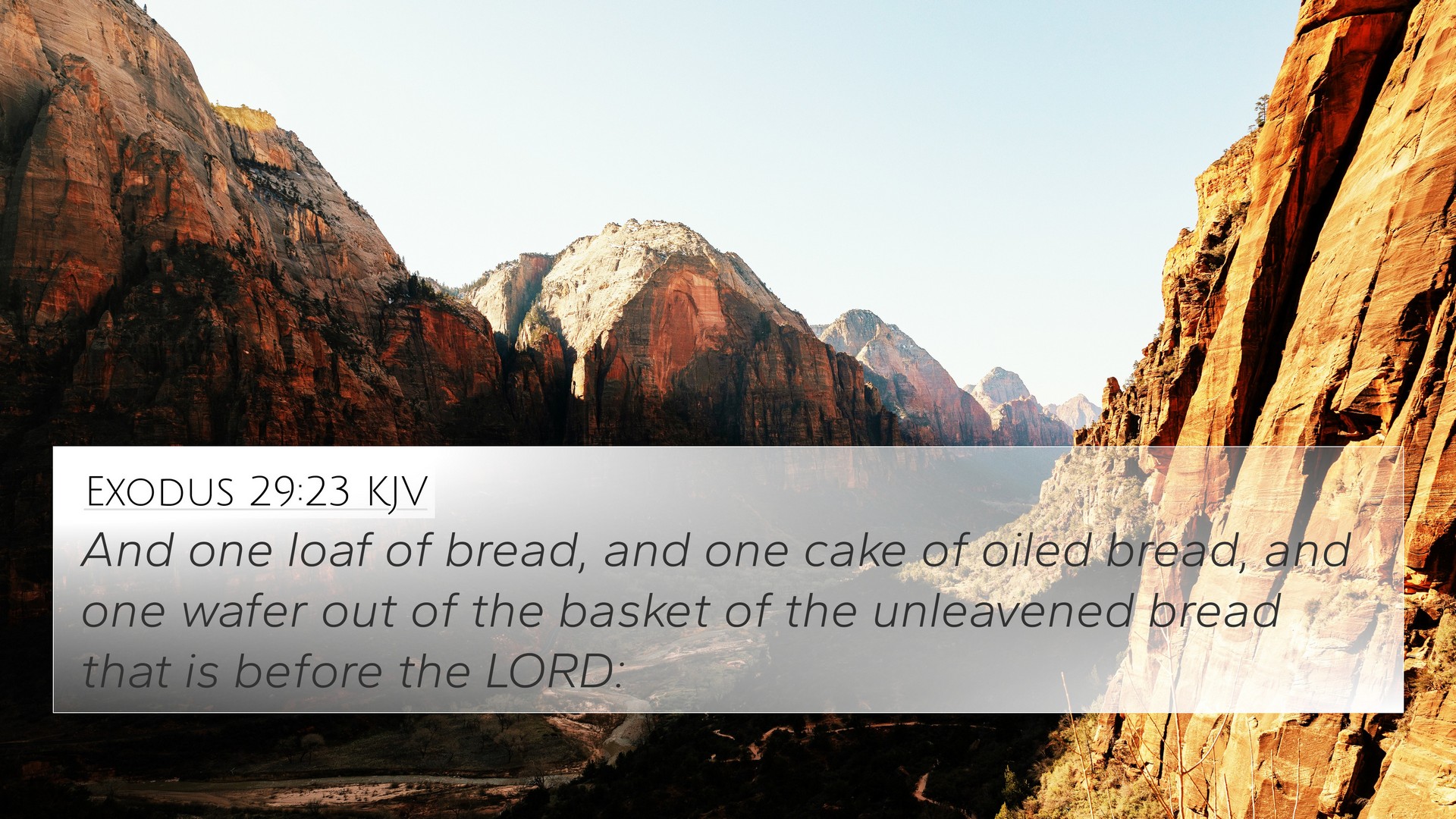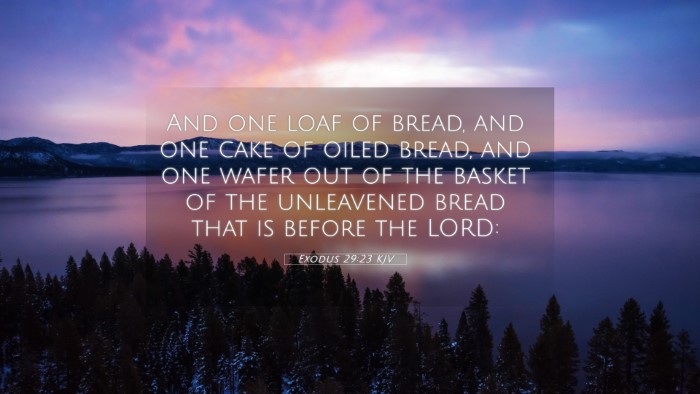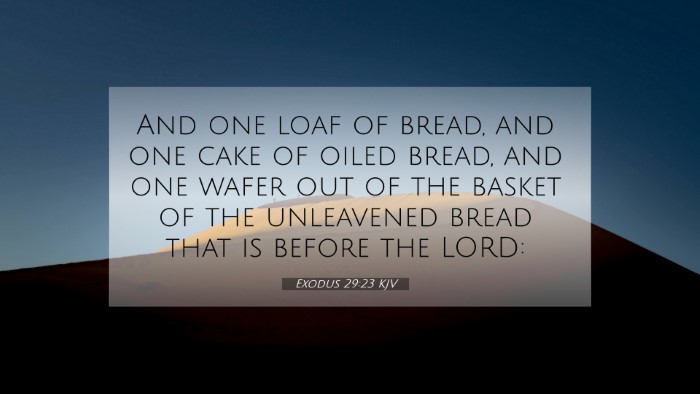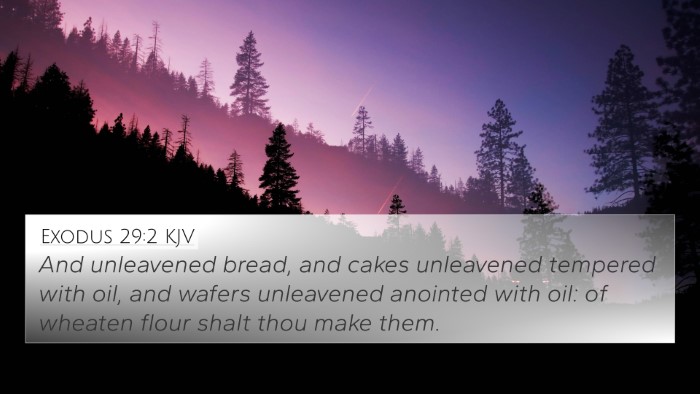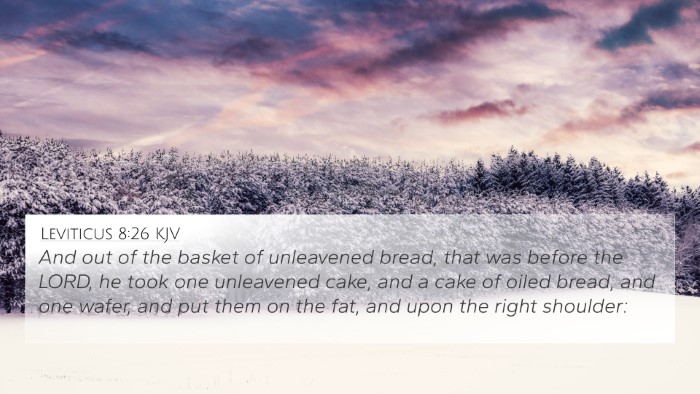Understanding Exodus 29:23
Exodus 29:23 states, "And one loaf of bread, and one cake of oiled bread, and one wafer out of the basket of the unleavened bread that is before the LORD." This verse describes the offerings that were to be presented in the context of the consecration of the priests.
To comprehend this verse fully, we can refer to insights from several public domain commentaries, including those by Matthew Henry, Albert Barnes, and Adam Clarke, which detail the significance of the offerings and their meanings within the broader context of the Israelite worship practices.
Key Themes and Significance
- Symbolism of Offerings: Each type of bread represents different aspects of communion with God. Bread is a staple of life, symbolizing sustenance and the Lord's provision.
- Covenant Relation: These offerings connect to the idea of a covenant relationship between God and His people, as they signify the priest's duty to intercede on behalf of the people.
- Consecration Ritual: The context of this verse is the consecration of Aaron and his sons as priests, emphasizing the seriousness and holiness required in their service.
Insights from Commentaries
Matthew Henry points out that these offerings were to be presented specifically for the priests and emphasizes the importance of being devoted to God, which these offerings symbolize. He notes that the variety of bread represents the different spiritual gifts and graces that believers are called to bring before the Lord.
Albert Barnes explains that unleavened bread signifies purity and sincerity in our relationship with God. The elements being offered are a representation of the people’s dedication and the offerings necessary for maintaining communion with God through the priestly system.
Adam Clarke elaborates that the ingredients of the offerings serve not only as a physical nourishment but also as a spiritual representation, signifying the need for constant holiness and dedication to God’s work.
Cross-References and Thematic Links
This verse is interconnected with several others throughout the Scriptures. Below are significant Bible verse cross-references that help in understanding the themes of Exodus 29:23:
- Leviticus 24:5-9 - Discusses the showbread which parallels the consecrated bread mentioned here.
- Matthew 26:26 - The Last Supper, where Jesus breaks the bread, connecting New Testament themes with Old Testament practices.
- Exodus 12:8 - The command regarding unleavened bread during Passover, reinforcing the importance of purity.
- 1 Peter 2:5 - Believers are described as a holy priesthood, suggesting a continuation of the priestly theme.
- Hebrews 9:23-24 - The heavenly reality of the sacrifices made for atonement connects to the earthly practices described in Exodus.
- John 6:32-35 - Jesus as the Bread of Life aligns with the sustaining nature of bread in Exodus 29:23.
- Romans 12:1 - The concept of presenting ourselves as living sacrifices echoes the themes of consecration.
Application for Today
Understanding Exodus 29:23 encourages believers to recognize the importance of their own spiritual offerings to God, fostering a spirit of consecration and commitment. It invites a thorough examination of what it means to live a life that reflects holiness and devotion to God.
Conclusion
Exodus 29:23 serves as a reminder of the rich traditions of offering and consecration within biblical worship. The insights from various commentaries reinforce the notions of spiritual sustenance, purity, and the ongoing covenant relationship that allows believers to connect with God actively. Through careful cross-referencing Biblical texts, one can deepen their understanding of the Scriptures as interconnected narratives that lead to a further appreciation of God’s design for worship.
